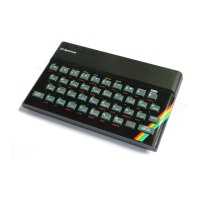Chapter 8
67
Reset button and expansion bus
Reset button
The SPECTRA interface provides a button which allows the Spectrum to be reset
without the need for removing and re-inserting the power connector, thereby reducing
wear on the connector and the power socket. Momentarily pressing the button will
cause the Spectrum to reset.
Upon the Spectrum resetting, the following actions are performed:
The standard display mode is selected (the display mode register reset to $00).
The Comms_Out flag is cleared, thereby deselecting RS232 output mode.
The CTS and RX data output lines of the RS232 port are set to the off state.
The Spectrum’s ROM is paged back in if an external ROM is active and the BASIC
extension mode is enabled.
Rear expansion bus
The SPECTRA interface provides a full width rear expansion bus to allow further
devices to be attached behind it. The rear expansion bus contacts are gold plated to
prevent them tarnishing easily and therefore to improve the reliability of the electrical
connection.
The expansion bus contains all of the signals exposed by the Spectrum except for the
video related signals /Y, U, V, 0V
video
and VIDEO, which are used exclusively by the
SPECTRA interface to synchronise the TV picture it generates with that produced by
the Spectrum. The signals already contain a large amount of electrical noise and so
they are not passed through to the rear expansion bus to avoid further pickup of
interference, which might otherwise prevent the display synchronisation mechanism
working correctly.
The /IORQ line that appears on the rear expansion bus is not directly connected to
that output by the Spectrum. This is done to allow the SPECTRA interface to filter out
accesses to the display mode register when the additional display modes functionality
is enabled. This is required so that the SPECTRA interface can coexist with (most)
devices that also use a base IO address of $DF and also with Kempston joystick
interfaces that do not fully decode the joystick input port address. The SPECTRA
interface forces the /IORQ line exposed on its rear expansion bus to logic ’1’ whenever
an access to the display mode register occurs. This prevents devices connected
behind it from detecting, and therefore responding, to such accesses. This issue is
discussed in more depth in Appendix B.
When the additional display modes are disabled via configuration switch 6, the
SPECTRA interface simply passes all I/O requests through to the rear expansion bus
unfiltered, thereby achieving full I/O compatibility with all existing devices.

